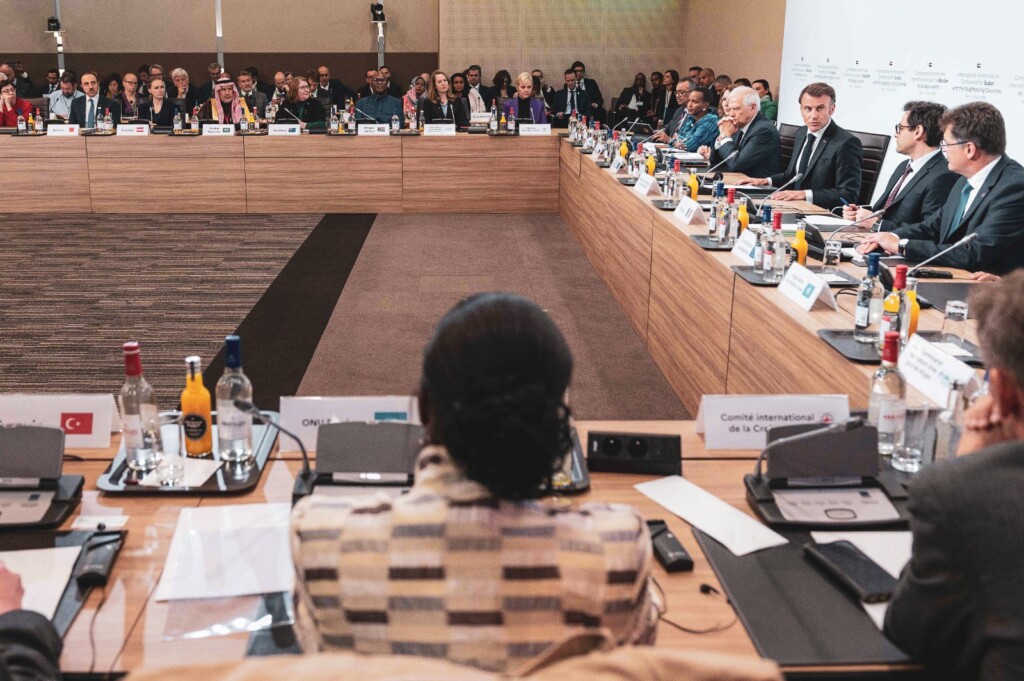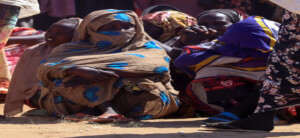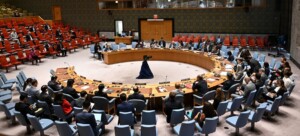Paris conference ‘returns Sudan’s issues to the forefront’

French President Emmanuel Macron chairing Paris Conference on Humanitarian Issues in Sudan concluded on April 15 2024 (File photo: French FA Ministry)
Coinciding with the first anniversary of the outbreak of war in Sudan, the Paris Conference on Humanitarian Issues in Sudan, concluded today under French, German and European sponsorship, and a with wide and numerous Sudanese presence, but with the absence of the armed parties to the conflict.
Sudanese writer and political analyst Fayez El Selik believes that the Paris conference represents a return of Sudanese affairs to the forefront again after an absence. In an interview with Radio Dabanga reporters Rashid Saeed and Omar Abdelaziz today, El Selik says that the Paris meeting is an opportunity to raise important issues, whether humanitarian or political.
Nasreldin Abdelbari, who served as Minister of Justice in the government of PM Abdalla Hamdok, agrees that the Paris meeting is of great importance to the Sudanese.
Abdelbari, who attended the conference, told Radio Dabanga that “in light of the many interests in the world directed towards specific conflicts, the Sudanese must have an opportunity to discuss and communicate with the world.”
Multiple spectra
The conference’s work was mainly divided into two parts: the humanitarian, related to attracting international support and delivering relief, and the political, related to stopping the war. It witnessed wide participation by many politicians, academics, and civil society activists.
Nisreen El Sayem, an activist in the field of climate change and issues of freedom and democracy, says that she received an invitation to participate in the civil society seminar accompanying the conference.
She told Radio Dabanga that the meeting brought together multiple factions of the Sudanese people, but they all agreed on the need to stop the war urgently.
Good start
In addition to politicians, academics, and civil society activists, the invitation was also extended to Sudanese journalists and media professionals.
Sudanese writer and journalist Khaled El Tijani says that various political positions were present during the discussions.
He told Radio Dabanga that the Paris conference was distinguished as being the first of its kind since the outbreak of war, bringing together participants with different backgrounds.
El Tijani says that the discussion dealt with several issues, including how to stop the war, humanitarian aid, and the political future of Sudan.
He considered the Paris conference a good start for discussing these issues, calling for it to continue in this manner, because it could lead to more understandings between the Sudanese.
‘Sudan’s absence’
Despite these generally optimistic opinions that praised the conference, there were limited voices critical of the conference, despite accepting the invitation and participating in it.
Salwa Adam, Sudan’s Humanitarian Aid Commissioner (HAC) and secretary general of the Sudan People’s Liberation Movement-North under the leadership of Malik Agar (SPLM-N Agar), currently vice president of the Sovereignty Council , said that there must be a clear message that this participating group does not represent the Sudanese people and is not authorised by them.
Adam expressed her regret at what she described as Sudan’s absence from the conference, adding that “it is not possible to invite an entity to a conference related to a country, and for the country to be absent at the same time,” as she described it.
She wondered how the conference’s outcomes would be conveyed, adding that it was inevitable that they would be conveyed on the ground through the existing government in Sudan.
An excuse to obstruct aid access
Fayez El Selik agrees that it would have been better for the Sudanese Armed Forces (SAF) and the Rapid Support Forces (RSF) to have been invited to the Paris conference, because working to deliver relief “requires talking about opening paths and protecting civilians” and other governmental and administrative measures.
But he added that if the international community wanted to deliver relief, “it could put pressure on the two parties to sit at the negotiating table,” considering that the humanitarian file is on the negotiating agenda.
He suggests that the two parties could use this point, i.e. not calling for the Paris conference, as an excuse not to deal with the international community, although they must be more careful “because they claim to be fighting for the citizen.”
El Selik asserts that if both parties to the war were concerned about the Sudanese citizen, they should not wait until measures were taken to “force them to deliver relief.”
The issue of opening routes and delivering relief remained one of the most important files requested by United Nations agencies and organisations working in the humanitarian field, but it did not receive much response from the two parties to the conflict in Sudan, the army and the RSF.
€2 billion pledged
As reported earlier by Radio Dabanga, France, Germany, and the European Union pledged more than €2 billion to address the humanitarian catastrophe in Sudan, at the Paris Conference on Humanitarian Issues in Sudan.











 and then
and then